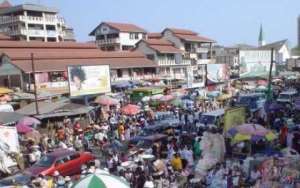
With less than a week to the signing of the agreement to allow free movement and trading among African countries, Nigeria has decided to pull out of the deal.
JoyBusiness has gathered that President of Nigeria, Mohammed Buhari has refused to attend the extraordinary meeting in Kigali, Rwanda.
This development will mean that the dream by African leaders to trade freely on the continent might be under threat, a situation likely to have a negative effect on the entire agreement considering the market size of Nigeria.
The decision described by an analyst as a “last-minute blow” sends a signal to the international community that Nigeria with its population of over 150 million and having the largest economy can call the bluff of the African Union and get away easily.
The African Continental Free Trade Agreement (CFTA), when implemented, will allow all member states access free trade and free movement among neighbouring countries without a quota.
Sources close to the negotiation told JoyBusiness earlier in the year that the Nigerian Chief Negotiator for the Free Trade Agreement, (FTA), Ambassador Chiedu Osakwe expressed a "measured optimism" that Nigeria could sign.
“But the question remains, "what does Nigeria want?" They did not want the EU-West Africa Economic Partnership Agreement” from one of the Chief Negotiators in the AU.
He added, “Within ECOWAS they have a "banned list" of goods even Ghana cannot export to Nigeria - yet ECOWAS has a Common External Tariff (CET). With the FTA they have been sending their Negotiating Teams to the A-FTA negotiations for the past 2 to 3 years.
Even Ambassador Cheidu Osakoe, formerly a Director at the World Trade Organization Secretariat, in the end, was the one who led the whole negotiation process for the past two years. So their reluctance to come on board would be unfortunate.
But unlike the EPA the other African countries can sign and ratify. Nigeria can join later if they so wish.
In the meantime, if others sign then South Africa, Kenya, Egypt and Morocco would be the key competitors in the Region” he concluded.
ECOWAS
However, International Trade Relations Expert Richard Amparbeng thinks the move by Nigeria is justifiable and should be supported.
He is rather asking Ghana and other West African Countries to join Nigeria in opting out in order to create a stronger West African market.
Mr Amparbeng speaking to JoyBusiness ahead of the AU extraordinary meeting cited unfair trade practices which Ghana could suffer as a result of the treaty.
Where does Ghana stand? Should Ghana sign the FTA? If so what strategies are in place to become key players in the emerging African continental marketplace?
Traders
Some Ghanaian traders have been complaining of the arrival of Nigerians in the local market space; Malian onions in Agbogbloshi, Tomatoes from Burkina Faso, Livestock from Niger, Sugar and Rice from other sources all heading to Agbogbloshie which has become the ECOWAS Trade Hub in Accra in the Product Value Chain.
After ratification, what the FTA will add and which Ghana has to prepare for is Kenyans, Egyptians, Moroccans, Cameroonians, Ethiopians, Rwandese to join Nigerians, Malians, Burkinabes in competing for the Ghanaian and the West African market space.
What will be Ghana's response to a Vision of an African Common Market which originates from the First President of Ghana in the 1960's - albeit 60 years late to be delivered as an African Free Trade Area?
Is Ghana ready with the goods and service to take to East, Central and Southern Africa? Have we prepared the mindset of the Ghanaian private sector led by the Ghana National Chamber of Commerce and industry and the Association of Ghana Industries?
The Free Trade Area is one of the flagship projects of Agenda 2063 and aims to deepen the integration process, by allowing Africans to trade and move freely across the continent.
The project is being driven forward along with other key related initiatives such as the Single African Air Transport Market and the Protocol on Free Movement of Persons and the African Passport.




 Akufo-Addo spotted ordering chiefs to stand for his handshake
Akufo-Addo spotted ordering chiefs to stand for his handshake
 Akufo-Addo ‘disrespects’ every chief in Ghana except Okyenhene — NDC Communicato...
Akufo-Addo ‘disrespects’ every chief in Ghana except Okyenhene — NDC Communicato...
 Supreme Court clears way for dual citizens to hold key public positions
Supreme Court clears way for dual citizens to hold key public positions
 Be transparent, don’t suppress the truth – Prof. Opoku-Agyemang to Jean Mensa
Be transparent, don’t suppress the truth – Prof. Opoku-Agyemang to Jean Mensa
 ‘I won’t tell the world I was only a driver’s mate during challenges’ – Prof Jan...
‘I won’t tell the world I was only a driver’s mate during challenges’ – Prof Jan...
 We’ll prosecute corrupt officials of Akufo-Addo’s govt – Prof Jane Naana
We’ll prosecute corrupt officials of Akufo-Addo’s govt – Prof Jane Naana
 [Full text] Acceptance speech by Prof Jane Naana Opoku-Agyemang as 2024 NDC Runn...
[Full text] Acceptance speech by Prof Jane Naana Opoku-Agyemang as 2024 NDC Runn...
 Election 2024: Don’t be complacent, we haven’t won yet – Asiedu Nketia cautions ...
Election 2024: Don’t be complacent, we haven’t won yet – Asiedu Nketia cautions ...
 Election 2024: Stop fighting over positions in Mahama’s next govt – Asiedu Nketi...
Election 2024: Stop fighting over positions in Mahama’s next govt – Asiedu Nketi...
 Prof Jane Naana Opoku-Agyemang will restore dignity of vice presidency – Fifi Kw...
Prof Jane Naana Opoku-Agyemang will restore dignity of vice presidency – Fifi Kw...
